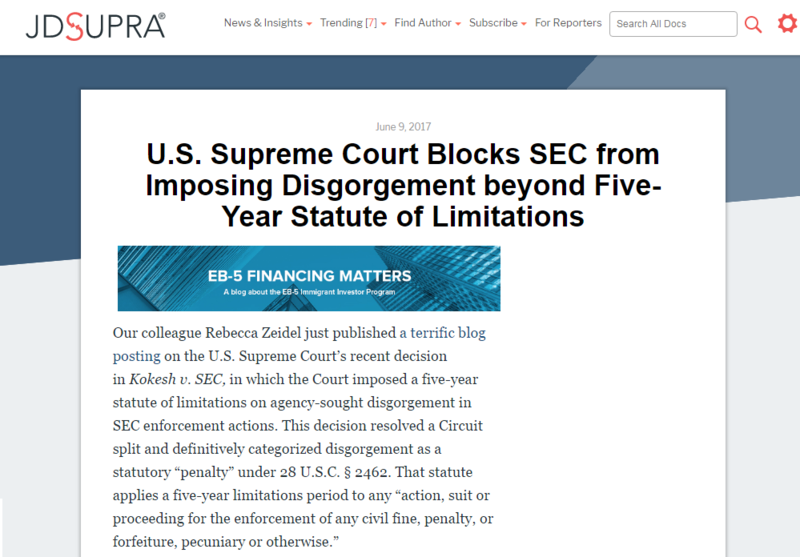U.S. Supreme Court Blocks SEC from Imposing Disgorgement beyond Five-Year Statute of Limitations
Our colleague Rebecca Zeidel just published a terrific blog posting on the U.S. Supreme Court’s recent decision in Kokesh v. SEC, in which the Court imposed a five-year statute of limitations on agency-sought disgorgement in SEC enforcement actions. This decision resolved a Circuit split and definitively categorized disgorgement as a statutory “penalty” under 28 U.S.C. § 2462. That statute applies a five-year limitations period to any “action, suit or proceeding for the enforcement of any civil fine, penalty, or forfeiture, pecuniary or otherwise.”
This development is relevant in the EB-5 litigation context, where we see the SEC impose disgorgement in administrative proceedings as one penalty, among others, against issuers or other parties who have engaged in securities fraud or other violations of the securities laws in EB-5 transactions.
The Court’s decision in Kokesh v. SEC may have limited practical application in the EB-5 space, as fraud or other violations in EB-5 offerings that could trigger disgorgement are often uncovered well within any five-year statute of limitations period. But the Court’s imposition of a five-year statute of limitations period on agency-sought disgorgement does restrict the remedies the SEC can seek in enforcement actions, and to this extent, the decision makes the SEC-imposed penalties playing field more level for EB-5 issuers and regional centers.
What’s the best line of defense generally for EB-5 regional centers, issuers and other parties in transactions who want to avoid SEC enforcement actions and penalties? One answer is carefully drafted offering documents. Take the time to ensure that offering documents are accurate and that material risks are clearly and sufficiently disclosed. Offering documents that go to market in a rushed fashion with gaps in material disclosures create risk for all parties in an EB-5 deal.
The SEC continues to prioritize enforcement in the EB-5 context. Litigation risk, civil penalties and disgorgement spring from carelessly drafted offering materials. High legal bills, reputational harm and termination of a deal are all consequences of poorly drafted documents. These costs can erase the economic benefits of EB-5 financing for an issuer and/or developer seeking EB-5 capital.
While Kokesh v. SEC is favorable to those seeking EB-5 financing in that the decision blocks the SEC from imposing disgorgement years after a violation occurs, our take-away today is simple: avoid administrative proceedings in the first place by ensuring that the documents you offer to investors are legally sufficient and protective of all parties in a deal.
http://www.jdsupra.com/legalnews/u-s-supreme-court-blocks-sec-from-15107/
Mentions
States
- District Of Columbia
Securities Disclaimer
This website is for informational purposes only and does not constitute an offer or solicitation to sell shares or securities. Any such offer or solicitation will be made only by means of an investment's confidential Offering Memorandum and in accordance with the terms of all applicable securities and other laws. This website does not constitute or form part of, and should not be construed as, any offer for sale or subscription of, or any invitation to offer to buy or subscribe for, any securities, nor should it or any part of it form the basis of, or be relied on in any connection with, any contract or commitment whatsoever. EB5Projects.com LLC and its affiliates expressly disclaim any and all responsibility for any direct or consequential loss or damage of any kind whatsoever arising directly or indirectly from: (i) reliance on any information contained in the website, (ii) any error, omission or inaccuracy in any such information or (iii) any action resulting therefrom.




